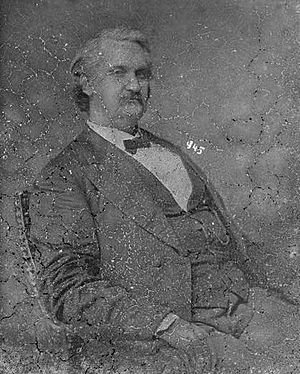George Cabell facts for kids
Quick facts for kids
George Craighead Cabell
|
|
|---|---|
 |
|
| Member of the U.S. House of Representatives from Virginia's 5th district |
|
| In office March 4, 1875 – March 3, 1887 |
|
| Preceded by | Christopher Thomas |
| Succeeded by | John R. Brown |
| Chairman of Committee on Railways and Canals | |
| In office March 4, 1877 – March 3, 1881 |
|
| Preceded by | Thomas L. Jones |
| Succeeded by | Amos Townsend |
| Member of the Virginia House of Delegates from Pittsylvania County and the City of Danville | |
| In office 1902–1903 Alongside R. Logan Coleman, Joseph Reynolds and J.W. Bruce |
|
| Personal details | |
| Born | January 25, 1836 Danville, Virginia |
| Died | June 23, 1906 (aged 70) Baltimore, Maryland |
| Political party | Democratic |
| Alma mater | University of Virginia |
| Profession | Politician, Lawyer, Newspaper Editor |
| Military service | |
| Allegiance | |
| Branch/service | |
| Rank | |
| Unit | 18th Virginia Infantry Regiment |
| Battles/wars | American Civil War |
George Craighead Cabell (born January 25, 1836 – died June 23, 1906) was an important figure in Virginia during the 1800s. He was a politician, a lawyer, and even a newspaper editor. He served as a congressman for Virginia in the United States House of Representatives.
Contents
George C. Cabell's Early Life and Career
Growing Up in Virginia
George Craighead Cabell was born in Danville, Virginia, on January 25, 1836. As a young person, he attended the Danville Academy. After that, he went on to study at the University of Virginia, where he graduated in 1857.
Starting His Career
After finishing his studies, Cabell became a lawyer in 1858. He started his law practice in Danville. In the same year, he was chosen to be Danville's commonwealth attorney. This job meant he was the main prosecutor for the area. He held this position until 1861. He also worked as an editor for a local newspaper called the Appeal. This paper supported the Republican views at first, and later the Democratic views.
Serving During the American Civil War
Joining the Confederate Army
When the state of Virginia decided to leave the United States in April 1861, George Cabell joined the Confederate States Army. He started as a private, which is the lowest rank for a soldier.
Rising Through the Ranks
During the first year of the American Civil War, Cabell quickly moved up in rank. He was promoted to major and then assigned to the 18th Regiment, Virginia Infantry. Later, he became a colonel, a high-ranking officer. He kept this rank until the war ended in 1865.
A Career in Politics After the War
Returning to Law and Entering Congress
After the Civil War ended, Cabell went back to his law practice in Danville. Once the period known as Congressional Reconstruction was over, he decided to run for a political office. In 1874, he ran as a Democrat for a seat in the United States House of Representatives.
He won the election, defeating the person who held the seat before him, Christopher Thomas. George Cabell was re-elected many times and served in Congress from 1875 to 1887.
Leading a Committee
While in Congress, Cabell took on an important role. He became the chairman of the Committee on Railways and Canals. This committee was in charge of laws about railroads and waterways. He led this committee from 1877 to 1881.
Later Years in Politics
In 1886, George Cabell tried to get re-elected to Congress but did not win. John R. Brown took his place. After leaving Congress, Cabell continued his law practice in Danville. His son, George Craighead Cabell Jr., also became involved in politics.
Death and Legacy
George Craighead Cabell passed away in Baltimore, Maryland, on June 23, 1906. He was buried in Green Hill Cemetery in Danville, Virginia.
Elections
George Cabell was elected to the U.S. House of Representatives multiple times.
- In 1874, he won his first election.
- He was re-elected in 1876, 1878, 1880, 1882, and 1884.
- In 1886, he lost his re-election bid.
 | Jessica Watkins |
 | Robert Henry Lawrence Jr. |
 | Mae Jemison |
 | Sian Proctor |
 | Guion Bluford |

